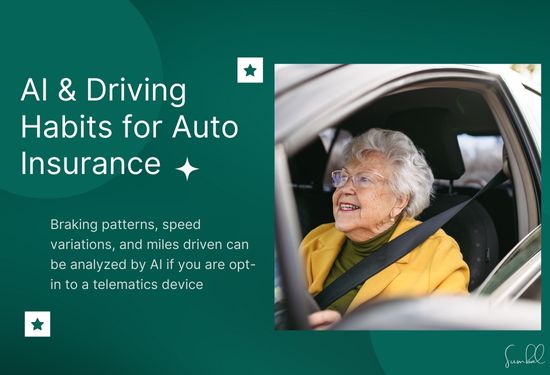The insurance industry has used data in risk tracking and finding policy rates for decades. AI made it easier for insurers to process customer data and information compared to traditional methods. Artificial intelligence and big data change the outlook on risk assessment and the specific rates that can be offered to customers depending on their behavior and situation. Now, let’s explore how AI is impacting the insurance industry in auto, health, and other classes of insurance.
1. Driving Habits for Auto Insurance
AI plays a significant role in auto insurance companies' determination of reasonable premiums to charge per individual for risky driving. Previously, simplified patterns were used, including age, gender, and past driving record. Today, telematics devices and mobile applications have AI capabilities to monitor and deliver driver behavior information, including the speed, manner of braking, and distance traveled, instantaneously.

For example, the system may damn a driver as low-risk if they do not break the speed limit and do not make hard brakes. On the other hand, reckless driving behavior, as realized with the same technology, might result in high rates.
2. Lifestyle Factors for Health Insurance
Insurance firms are using artificial intelligence to determine health insurance premiums based on lifestyle choices and medical histories. Innovative accessories include fitness trackers that record physical movement, sleep, and cardiac rhythm data. AI then uses this data to find a correlation between health risks associated with specific patterns.
For instance, a policyholder who exercises does not smoke, or is overweight may be classified as low risk and thus eligible to be charged lower rates. However, the increased rate is due to smoking or lack of exercise.
AI also combines and compiles medical history and genetic information, where allowed, to estimate health risks for chronic diseases or other complications. This allows insurers to develop unique policies to cater to individual health risks.

3. Fraud Detection and Claims Processing
Fraud assessment is another reason for using predictive analytics because specific patterns suggesting fraudulent claims can be detected. For instance, if the number of claims increases immediately after a small crash, an AI can generate an alert about further investigation.
That is, increasing efficiency in fraud detection reduces costs by enabling insurers to offer lower premiums. Further, it reduces the claim processing time and provides faster payout to customers.
4. Dynamic Pricing Models
AI enables insurers to adopt value-based pricing, adjusting prices according to the collected data. For instance, life insurance may be refreshed periodically based on data from wearable health monitors, and home insurance rates may be adjusted based on smart home technologies that reduce risk factors such as fire alarms or security systems.

5. Ethical Considerations and Data Privacy
Although there are big benefits insurance can get from AI, its application has ethical and privacy issues. An insurer cannot use customer data in a suspicious manner or in ways contrary to the law and the customer's rights. AI models must also not possess biases that would otherwise result in certain groups being disadvantaged.

10 Business Loan Myths Debunked: What Every Small Business Owner Should Know in 2024

Finance Isn’t "Trading": Grow Money Purposefully

Creating a Financial Safety Net: How to Insure Against Uncertainties of Life

Economic Cycles: Navigate Market Swings

Crafting Your Wealth Blueprint

A 10-Year Finance Journey of an Office Worker

The Future of Financial Services in the Age of Big Data
